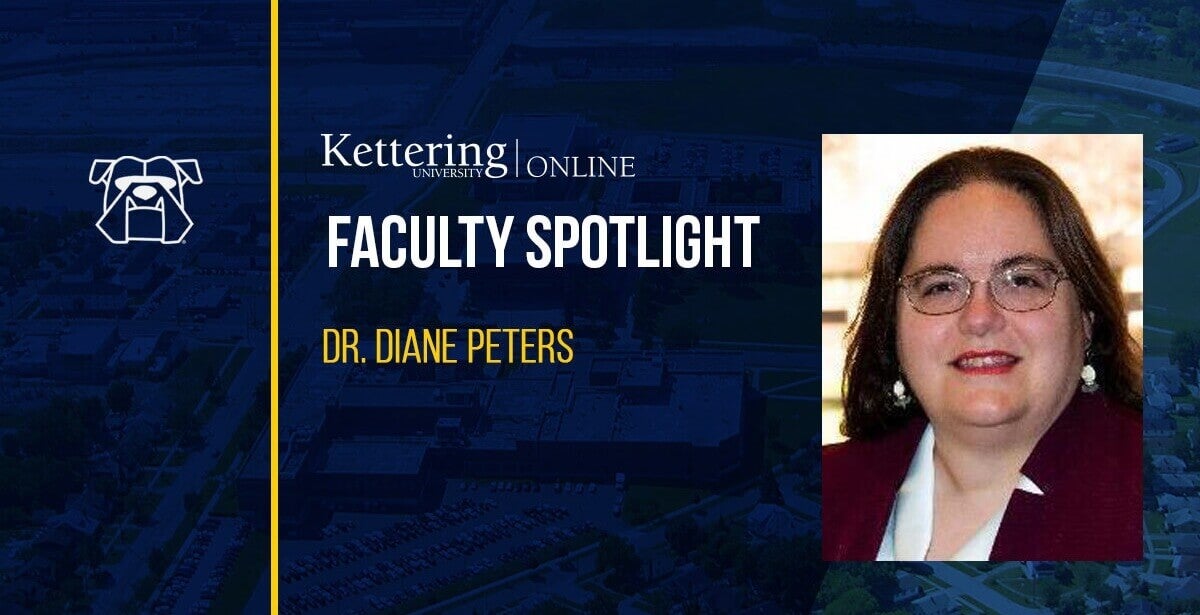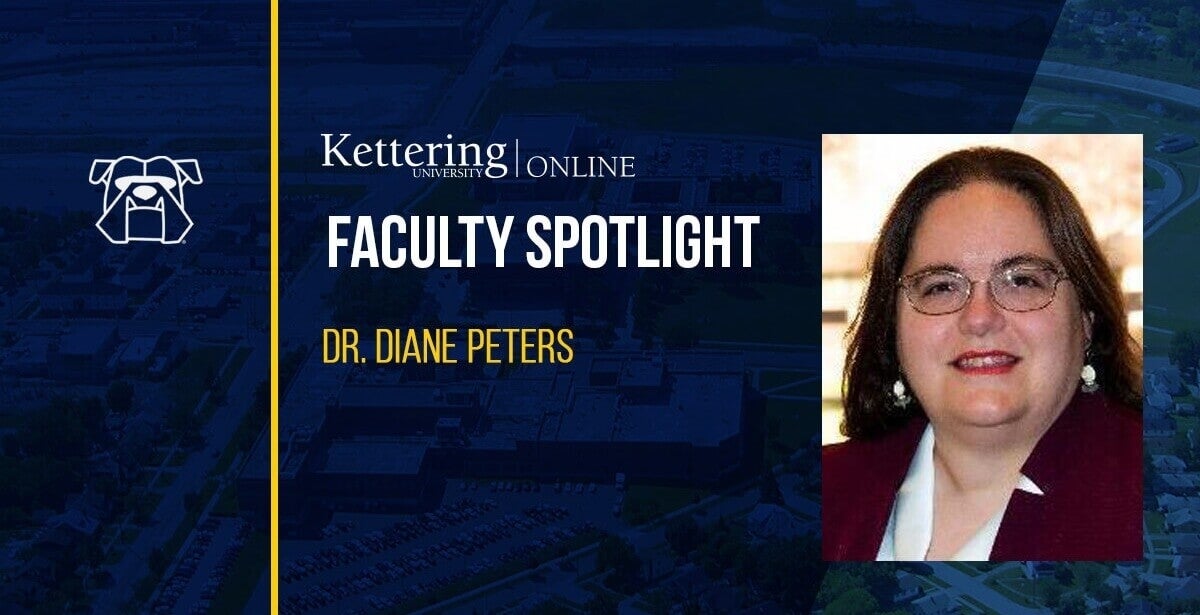
Faculty Spotlight: Dr. Diane Peters, Associate Professor Mechanical Engineering, Kettering University
By Jennifer Levy, MA
Program Development Manager/Senior Instructional Designer
Kettering Global
As Kettering University Online’s (KUO) Program Development Manager and Senior Instructional Designer, I have the pleasure of working with faculty members who come from a wide range of educational, career, and geographical backgrounds and are united in the effort to link transformative experiential education to rigorous academic standards with real-world applications for learning that lasts a lifetime.
This time, I talk with Dr. Diane Peters, Associate Professor Mechanical Engineering, Kettering University.
Dr. Peters was born and raised in Midland Michigan, not far from Flint-based Kettering University. She received all her degrees in Mechanical Engineering – a BS from the University of Notre Dame, MS from the University of Illinois at Chicago, and her doctorate from the University of Michigan.
Dr. Peters graciously found some time in her busy schedule to chat with me. The following are excerpts of our conversation:
Jennifer Levy: Let’s start by having you explain your teaching philosophy.
Dr. Diane Peters: In brief, my teaching philosophy focuses on linking theory and practice. I think it's important to know the theory, otherwise you can't address new situations where the things that have always worked break down; but if all you know is theory, it's hard to solve practical problems.
Jennifer Levy: What were some of your first thoughts about teaching online?
Dr. Diane Peters: That it takes a different approach - things that work well in a classroom can't always be exactly copied. This is kind of like my teaching philosophy, in a way - you need a theory to be able to modify what you do to a new situation – just like transitioning from teaching in-person to teaching online.
Jennifer Levy: Describe your Kettering students.
Dr. Diane Peters: They are awesome, smart, interested, dedicated, and inquisitive.
Jennifer Levy: Having soft-skills has become increasingly important to employers. What are the top three soft-skills students should work to cultivate?
Dr. Diane Peters: Time management is critical, in work and life. Communication skills are also important - orally, in writing, and graphically – especially sketches, CAD drawings, diagrams, and graphs. Teamwork is also critical. Students must consider how they can work productively, and respectfully, with people whose skills, talents, and outlooks are different from their own.
Jennifer Levy: What advice would you give to the potential KUO student who has never taken an online course?
Dr. Diane Peters: Keep up with the work, and don't get behind. It's manageable if you keep up, but if you get behind, it starts to snowball quickly. Be disciplined - set aside a time and a place to do your schoolwork. If you don't, then the fact that you can do it anytime, within a certain time, sometimes means it won't happen.
Jennifer Levy: Can you talk a bit about what it is like being a female in a male-dominated industry and whether you see changes for the better?
Learn More About Our Masters Programs
Dr. Diane Peters: Things have improved a lot, but we are not where we need to be. If you talk to people who have worked in the field longer than I have, you hear tales of women being openly denied jobs, promotions, and raises. Now, the problems are more about culture and unconscious bias. Negative things still happen; women still need to prove themselves a little more to certain men, demonstrate their competence instead of having it assumed, and/or deal with the assumption that they don't know what they're talking about. On the other hand, there are a lot of people, men and women, who will clearly tell men who are being openly biased that it's not acceptable, and that represents progress.
Jennifer Levy: Can you talk a bit about your involvement with the Society of Women Engineers (SWE)?
Dr. Diane Peters: I've been involved with SWE since I joined in the fall of 1989, as a college freshman. I was an active member of my collegiate section at Notre Dame, then held quite a few officer and committee chair positions in the Chicago Regional Section when I lived in that area. I've also served at the Regional and Society levels. I have planned events, presented at conferences, run countless meetings, and built a network of friends and colleagues whom I highly value.
Jennifer Levy: A few years ago, you participated in Kettering's Distinguished Faculty Speaker Series and addressed the topic of How Work Experience Impacts Engineering Graduate Students. Can you elaborate on that talk?
Dr. Diane Peters: That talk was based on research that I've been doing, supported by the National Science Foundation, on a group of graduate students, who my collaborators and I call "returners". These are graduates who work in industry or some other type of job, then return to graduate school for an additional degree. In some ways, they are typical of any graduate student, but there are some differences. Their work experience has given them the opportunity to develop a variety of skills, both technical and non-technical. They are also very motivated, in general, as graduate school isn't a natural or obvious next step. It's something they've made a conscious choice to do. However, they do face some challenges. If they go to school while working, they need to balance work and school. If they leave the workforce temporarily, then they have financial challenges. If they've been out for a while, they may be a little rusty on some subjects, and have to work harder than other students to "brush off the cobwebs". Overall, they add a lot to the graduate school culture, and should be valued by universities.
Jennifer Levy: What is the best advice a professor ever gave you?
Dr. Diane Peters: A professor once told me to learn to use an equation editor for a paper I was writing. That seems incredibly specific, but it points to a larger issue - always make sure you learn and use the right tools for what you are doing. Doing so is ultimately quicker and yields better results than trying to force the wrong tool to do what you want to do.
Jennifer Levy: Please add any particular career achievements or highlights.
Dr. Diane Peters: I have won a lot of awards. One of the biggest highlights, though, is being selected as a Fellow of the Society of Women Engineers. This was ultimately the culmination of many things I've done and puts me in the company of a lot of amazing women.
Jennifer Levy: What fun things do you like to do in your spare time?
Dr. Diane Peters: I have two dogs, and I love spending time with them. I quilt, sew clothes, woodworking of various types - primarily scroll saw - and I regularly attend classes in Brazilian Jiu Jitsu. I currently have a blue belt with four stripes. I also volunteer for various causes, particularly animal welfare and the Epilepsy Foundation.
KUO honors and appreciates Dr. Peters for her contributions and highly regarded work with students and for taking time to chat!

